1. Enhancing HIV Prevention & Care Through Nurse-led PrEP Programs
Friday, July 11th, 2025 | 11:30 AM - 12:30 PM EST
Presented by:
Andi Fair, MSN, CRNP, WHNP-BC, FNP-BC
Nurse Practitioner
UPMC Children's Community Pediatrics
Learning Objectives:
-
Describe the implementation of clinical HIV testing and testing technology.
-
Discuss the initial clinical evaluation of a patient with HIV.
-
Discuss the importance of initiating PrEP.
-
Determine best practices for implementing nurse-led PrEP programs.
2. HIV and Pregnancy: Advancing Care, Reducing Transmission, and Supporting Maternal Health
Tuesday, October 7th, 2025 | 1:00 PM - 2:00 PM EST
Presented by:
Melonie A. Owusu, DNP, CRNP, FNP-BC, AACRN, AAHIVS
Nurse Practitioner Lead Nurse Practitioner, THRIVE Program
Institute of Human Virology
University of Maryland, Baltimore (UMB), School of Medicine
UMB Clinical Educator, MidAtlantic AETC
Learning Objectives:
-
Describe the current guidelines for HIV screening, diagnosis, and antiretroviral therapy (ART) management during pregnancy.
-
Discuss key strategies to reduce perinatal HIV transmission, including maternal viral suppression, intrapartum care, and neonatal prophylaxis.
-
Identify whole-person support strategies to enhance adherence and engagement in HIV care during pregnancy.
3. Navigating the HIV Care Continuum: Essential Skills for Providers
Wednesday, November 19th, 2025: 12:00 PM - 1:00 PM EST
Presented by:
Brenice Duroseau, MSN, FNP-C, RNC-OB, AAHIVS
Nurse Practitioner, Infectious Diseases & Addiction Medicine
Behavioral Health ?Leadership Institute
HIV Implementation Science Fellow, Center for AIDS Research
Johns Hopkins University, School of Nursing
Learning Objectives:
-
Define the HIV Continuum of Care and its role in tracking HIV health outcomes.
-
Discuss approaches to encourage ART uptake in patients newly diagnosed with HIV.
-
Discuss the importance and metrics to monitor HIV engagement and retention in care data in the US.
-
Identify factors that impact retention in HIV medical care and discuss strategies to promote re-engagement of those lost to care.
4. Integrating HIV Care into Primary Practice: Advancing Prevention, Diagnosis, and Management
Tuesday, December 16th, 2025 | 11:00 AM - 12:00 PM EST
Presented by:
Cara McAnaney, MD, AAHIVS
Assistant Professor, Family Medicine
Director of HIV Primary Care Track, Family Medicine Residency Program
University of Pittsburgh, School of Medicine
Family Medicine Physician and HIV Specialist, UPMC Latterman Family Health Center
Learning Objectives:
-
Explore the essential elements of comprehensive HIV care and describe how they can be effectively incorporated into routine primary care visits.
-
Identify appropriate screening and diagnostic protocols for HIV in the primary care setting, including approaches for workflow integration.
-
Discuss best practices in PrEP and PEP prescribing, incorporating patient-specific considerations, medication interactions, and adherence challenges.
-
Optimize antiretroviral therapy (ART) management in complex patients, including those with comorbidities, polypharmacy, resistance concerns, or inconsistent engagement in care.
5. Enhancing HIV Linkage to Care: Strategies, Metrics, and Best Practices
January 14th, 2026 | 1:00 PM - 2:30 PM EST
Presented by:
Wayne Duffus, MD, PhD
Clinical Leader for Holloway Community Program,
School-Based Wellness Centers and Juvenile Justice
Learning Objectives:
-
Describe benchmarks for successful linkage to care after HIV diagnosis.
-
Discuss the metrics used to monitor HIV linkage to care in the US.
-
Explore evidence-based strategies for optimizing linkage to care for persons newly diagnosed with HIV in the US.
-
Discuss the role of community-based organizations (CBOs) in improving linkage to care.
6. Comprehensive Approaches to HIV Initial Evaluation: Best Practices and Innovations in Care
February 24, 2026 | 12:00 PM - 1:00 PM EST
Presented by:
Tyris Ford, DNP, NP-C, FNP-BC, AAHIVS
Clinical Leader for Holloway Community Program,
School-Based Wellness Centers and Juvenile Justice
Learning Objectives:
-
Describe key elements for physical examination, baseline laboratory tests, and monitoring considerations for the initial evaluation.
-
Identify the stages of HIV disease, the criteria for each stage, and clinical treatment and interventions.
-
Discuss strategies to care for the “whole person” to improve outcomes.
-
Discuss components of behavioral assessment.
7. HIV in Adolescents: Clinical Strategies for Prevention, Early Detection, and Care
March 2026
Presented by:
Roberta Laguerre-Frederique, MD
Assistant Professor, Department of Pediatrics
Drexel University, School of Medicine
Director of Prevention & Outreach Services | Attending Physician
Dorothy Mann Center for Pediatric & Adolescent HIV
St. Christopher's Hospital for Children
Learning Objectives:
-
Describe current epidemiologic trends in HIV among adolescents and young adults.
-
Identify evidence-based strategies for HIV prevention in adolescents, including appropriate use of screening, patient education, and pre-exposure prophylaxis (PrEP) when indicated.
-
Discuss the clinical and developmental considerations that impact HIV diagnosis, treatment adherence, and retention in care for adolescent patients.
8. Integrating Mental Health and HIV Care for Whole-Person Health
April 2026
Presenter TBA
Learning Objectives:
-
Define the concept of a syndemic and discuss how co-occurring mental health conditions and HIV intersect to affect patient outcomes.
-
Describe the impact of common mental health conditions on HIV prevention, treatment adherence, and long-term care.
-
Identify and implement integrated care models that address HIV and behavioral health needs within a whole-person framework, utilizing interdisciplinary collaboration to enhance care.
9. Nourishing Health: The Role of Nutrition in HIV Management and Care
May 2026
Presenter TBA
Learning Objectives:
-
Describe the impact of HIV infection and antiretroviral therapy on nutritional status and metabolic health.
-
Identify common nutritional deficiencies and related complications associated with HIV.
-
Discuss evidence-based nutritional assessments, interventions, and counseling to support immune function, medication adherence, and overall well-being for people with HIV.
10. Integrating HIV Services into Substance Use Treatment
June 2026
Presenter TBA
Learning Objectives:
-
Describe the importance of routine HIV testing and early diagnosis among individuals with substance use disorders.
-
Identify key barriers and facilitators to effective linkage to HIV care within substance use treatment settings.
-
Apply whole-person strategies to support adherence and retention in HIV care for individuals engaged in substance use treatment programs.



